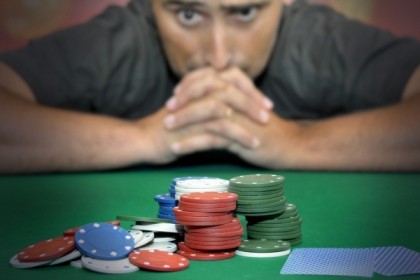Who Are We to Judge?
Devra Torres | Apr 24, 2014 | 4 cmts
Things are not always what they seem. And the actions of human persons, perceived from the outside, can be farthest of all from appearances.
One day long ago I was reading from the Book of Genesis to my four-year-old, who occasionally had trouble getting along with her little brother. When we got to the part where “Cain rose up and slew his brother Abel,” I stopped and elaborated. “He killed his own brother!” I explained, suspecting that “slew” might be pushing the limits of her vocabulary.
“He killed his own brother!” I explained, suspecting that “slew” might be pushing the limits of her vocabulary.
My daughter looked properly shocked. “I would never kill my brother,” she declared (to my secret relief). But then she continued: “…because I don’t know how to kill people!”
They get along fine now. But her point was made. Sometimes what looks like virtue is really just incompetence. She lacked the means.
Some people don't lack the means, but they do lack the motive.
C. S. Lewis points out that certain people, like himself, are simply not enticed by the idea of, say, gambling, or engaging in homosexual acts.  It’s easy to feel superior to someone who succumbs to a temptation that leaves you cold, but it's still irrational. Lewis calls such temptations “enemies I have never met in battle” and declines to expend energy inveighing against them. Being immune to a temptation is not the moral equivalent of being enticed but standing firm, no matter how much alike they may look from the outside.
It’s easy to feel superior to someone who succumbs to a temptation that leaves you cold, but it's still irrational. Lewis calls such temptations “enemies I have never met in battle” and declines to expend energy inveighing against them. Being immune to a temptation is not the moral equivalent of being enticed but standing firm, no matter how much alike they may look from the outside.
Addiction is another factor that can affect motivation and make disparate situations look similar. An alcoholic friend once described the difference between a non-alcoholic’s reaction to a bottle of beer that someone had carelessly left out on the counter and her own. For the person untroubled by addiction, the bottle didn't even register; for her, it triggered a painful interior battle.  There's something in play here other than greater or lesser stores of virtue and vice, willpower and weakness.
There's something in play here other than greater or lesser stores of virtue and vice, willpower and weakness.
I'll leave it to those who know more to determine to what extent addiction is a disease and to what extent free will is involved. I'm certainly not about to set myself up as judge of any particular person. But whatever the proportion, it's yet another case where what-all somebody's up against is far from evident.
Finally, some of us lack opportunity. Indignation at the infidelities of spoiled celebrities or the deceitfulness of politicians can become like a spectator sport.  We know that “there but for the grace of God go I” is a pleasingly humble sentiment, but that doesn't mean we can say it with a straight face. We know St. Paul called himself the worst sinner of all, and we admire his modesty, but do we think he meant it? We imagine we know how our willpower would stand up against temptations we’ve never been rich or famous or powerful enough to experience.
We know that “there but for the grace of God go I” is a pleasingly humble sentiment, but that doesn't mean we can say it with a straight face. We know St. Paul called himself the worst sinner of all, and we admire his modesty, but do we think he meant it? We imagine we know how our willpower would stand up against temptations we’ve never been rich or famous or powerful enough to experience.
We (most of us) lack opportunity.
Even our human justice system weighs means, motive and opportunity, not only to identify the culprit in the first place, but also to determine the degreee of culpability. So the next time your toddler says something that sounds especially holy or especially horrible, don't jump to conclusions. Things might not be as bad as they seem, or, then again, they might be a whole lot worse.

Comments (4)
Sapperdepitjes
Apr 25, 2014 5:59pm
Reminds me of a popular French song of a quarter century ago...
http://www.youtube.com/watch?v=T6YOz98lmOA
http://en.wikipedia.org/wiki/Né_en_17_à_Leidenstadt
Devra Torres
Apr 25, 2014 8:03pm
Yes, good point--it's easy, with hindsight, to assume we would have stood up against socially approved injustice and risked ridicule and persecution and death. Now that anti-Christian persecution is escalating, many of us sheltered people will get the chance to form a more realistic idea of our own courage!
Katie van Schaijik
Apr 26, 2014 3:16am
Devra, your story about your daughter reminds me of a time when my oldest son was 2. The Olympics were on TV, and the Americans were on the balance beam. He was normally a rather hyperactive toddler, but he suddenly noticed what was happening on the TV, and stood utterly still in front of it, entranced.
My heart melted, tears sprang to my eyes, as I thought, "He's only two years old, and yet, look at how receptive he is to the beauty and grace of that young woman performing those amazing feats!"
Then he turned around and said, "Mommy, I want to push her off."
Katie van Schaijik
Apr 26, 2014 3:24am
More directly to the point of your post, I remember a friend once telling me that whenever she would say something judgmental about some situation she'd come across, her mother would gently remind her, "We don't have enough information."
As Newman said—and Wojtyla too—each other person is a whole other world of existence. He is dealing with a complex array of considerations and circumstances and influences that we can't begin to fathom. We are simply in no position to judge the all-important why of his acts and choices. (Only think how incomplete our understanding of our own motivation is in any given concrete situation!)
Really, the best we can do is be there for each other, ready to help if we can.
I would say this is the number one lesson I have been learning in my middle age. I would also say that while I've "seen it" and learned it intellectually, when it comes to resisting the habits of lifetime, I'm a lot like that alcoholic friend of yours seeing a beer bottle.